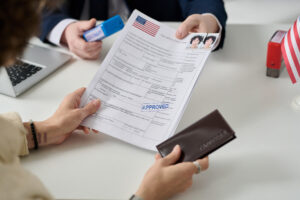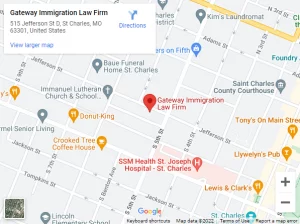Unless they qualify for entry under the Visa Waiver Program, foreign citizens visiting the United States for tourism, business, or medical treatment need a visitor visa. What is a visitor visa? And what are the steps in getting a business and tourist visa?
Visitors visas are issued to citizens of countries under the non-visa waiver program who want to enter the United States briefly for business, pleasure, or medical treatment. This is divided into two categories: B-1 (temporary business visits) and B-2 (tourist or medical treatment). In reality, temporary business visas are granted in conjunction with tourist visas. As a result, if an applicant already holds a tourist visa that has not yet expired, they can go to the US for a scheduled business trip. Though studying in the B category is not allowed, specific study related to legit travel to the US is allowable.
Under the Immigration and Nationality Act, a person who wants a visitor visa is presumed to have immigrant intent. A visitor visa applicant must prove to the consulate general that they are not an intending immigrant by showing all of the following:
- Their intended stay in the United States is just temporary.
- They have enough money to cover all expenses.
- They have solid social and economic commitments to their foreign residence and have no plans to abandon it.
Please remember that if you are a national of a country under the visa-waiver program, you DO NOT need to apply for a tourist visa to visit the US for leisure or pleasure. But, if you want to visit the US as a temporary business traveler in the future, for example, to apply for an investment visa, you need to first file for a Temporary Business Visitor visa before flying to the US. If you want more detailed information on how to get a business visa and tourist visa, please speak with one of the Missouri immigration attorneys at Gateway Immigration Law Firm. Call our law firm now to set up an appointment!
How Do You Qualify for a Business Visa?
In law, all applicants for visitor visas are presumed to be intending immigrants. As a result, B-1 visa applicants must dispel this assumption by demonstrating:
- Their travel is intended to do business in the United States.
- They intend to stay for a specified, limited period.
- Evidence of money to cover trip expenditures, such as all travel, lodging, and other living expenses throughout their travel to the United States. If there are insufficient funds to finance the trip, give proof that the employer will extend support.
- Strong evidence of economic and social ties abroad, and also other strong ties that will ensure the visitor’s exit at the end of the trip and that the visitor holds a residence abroad that they do not intend to give up.
- The visitor is not involved in any skilled/unskilled labor, studies, or job as a foreign press, film, radio, or other informational media.
- The visitor should not be visiting the United States to give services or participate in activities solely for the benefit of a US employer.
The B-1 business visa is for those traveling to the United States temporarily to conduct legitimate business of a professional or commercial nature. B-1 visa holders cannot accept salary, compensation, or other payments from the US other than for reimbursement for travel costs.
Activities that are Permissible Under the Business Visa Category
Being engaged in commercial transactions that do not involve gainful employment is permissible under B1. Some examples are:
- Taking sales orders or purchasing supplies or inventory for a foreign employer;
- Negotiation of contracts;
- Consultation with business associates;
- Participating in a lawsuit; or
- Engaging in scientific, professional, educational, or business conferences or conventions.
The most prevalent specialized activities are as follows:
- Serving as a domestic or personal helper for a nonimmigrant on a short assignment in the US, an American citizen subject to international transfers and temporarily in the United States, or an American citizen visiting briefly in the US but residing overseas;
- To compete in a sports event as a professional athlete whose sole income is the prize money received by the athlete;
- To engage in a volunteer service program that helps a local US community, participants must demonstrate membership in and commitment to a recognized nonprofit or religious charitable organization;
- Install, repair, or service equipment or machinery acquired outside the United States or train US personnel to do so;
- For business purposes, such as consulting with contacts in business, conducting deals, settling an estate, pursuing investment or sales, as well as interviewing and recruiting employees;
- To undertake professional responsibilities that would usually qualify the individual for an H-1 immigration visa status, however, the visitor would not be paid by a US source;
- To look into the possibility of establishing a branch of an international firm or making investments;
- Short-term training, professional, scientific, educational, or business conventions, seminars, conferences, or research;
- To fulfill responsibilities as a member of the board of directors of a US-based corporation, such as attending regular board meetings; and
- For deadheading, certain aircrew members can enter the US as deadhead crew with a business visa.
Getting a Business Visa
Generally, applicants for business visas should apply at the US Embassy or Consulate with jurisdiction over their permanent residence. Though visa applicants can file applications at any US consular office overseas, qualifying for a business visa outside the place of permanent residence may be more challenging. The consular officer’s discretion is always used in making final decisions.
Note that a criminal past, previous visa denials in the US, fraud or false representation, and inadmissibility concerns may result in denial. Before you apply for a visitor visa, speak with an immigration attorney first. If you have one of these problems, you can still apply for a B-1 and B-2 visa by filing a waiver.
An interview at the visa section of the embassy consular department is needed for B-1/B-2 visa applicants as part of the visa application procedure. People under 13 years and above 80 years old are usually exempt from interviews unless sought by a consulate or embassy.
Supporting Documents
All visitor visa applicants must provide documents to support their business visa application. The list is not all-inclusive, and you should discuss with a Missouri immigration attorney in more detail the specifics of your application. Depending on the circumstances, more documents may be required.
The list contains, but is not limited to, these items:
- Visa Application Form DS-160 (Nonimmigrant Visa Application): A letter from the applicant and the alien’s employer detailing the business requirement for the travel and the exact nature of the travel, including dates, places, and what specific bona fide arrangements were made to exit the US.
- A valid passport for travel to the US: The passport must be valid for at least six months beyond the expected stay of the applicant in the US. If the passport includes more than one person, each visa-seeking individual needs to complete a DS-160 nonimmigrant visa application and keep at least one empty page in their passport.
- Two color photos of a full face on a light backdrop: If a religious organization requires it, one may wear a headpiece. Nonetheless, the headpiece must not conceal one’s face.
- Brochures, catalogs, and annual reports describing the company
- A proof of the itinerary for the duration of your stay (if necessary)
- A proof of your flight showing your intended return to the US
- Documentation showing the alien’s or their employer’s capacity and willingness to support the alien’s travel costs throughout their stay in the United States: This is also known as a ‘letter of financial sponsorship’. The applicant has to supply their financial documents proving that they can pay for themselves throughout their intended stay (e.g., bank statements).
- Documents proving your ultimate return to your home country as proof of genuine obligations abroad binding you to your home country: Ties to the home include, but are not limited to, ticket bookings for flights back home, evidence of residency abroad, proof of debts you owe abroad, insurance plans, business operations or ownership, academic enrollments, asset ownership abroad, proof of familial obligations, and so on.
- Any previous US visas you have received if relevant.
- A visa is valid until its expiry date unless previously canceled. If the visitor has a valid United States visa in an expired passport, do not take the visa out of the expired passport. It can be used together with a new passport to travel to and enter the US.
Visitors must show that they are correctly classified as business visitors under US law through the following:
- Proof demonstrating the purpose of the travel, intent to leave the US, and arrangements to finance the trip’s costs may be supplied. Because applicants’ circumstances vary greatly, it is hard to establish the precise form the required document should take.
- Visitors who don’t have adequate finances to support themselves while in the United States must give convincing proof that an interested party will finance them during their stay.
- Applicants may supply additional documents substantiating the purpose of the travel and outlining the extent of binding obligations, like familial ties or jobs that would require their return overseas.
- Visitors are not allowed to work while in the United States.
Terms of Stay and Extensions
Business visitors may be allowed for no more than one year and may be given temporary stay extensions in increments of no more than six months. However, most B-1 entries are granted only for the time required to do business and are generally limited to a three-month stay.
A visa does not ensure admission into the US. Immigration officials can refuse entry and regulate how long a visiting visa holder is permitted to stay in the US. Officials from the Department of Homeland Security (DHS) and Customs and Border Protection (CBP) at the port of entry have the authority to grant or deny entry to the United States. The Form I-94 (Record of Arrival-Departure), which details the period of stay authorized, is stamped at that time. Visitors who plan to remain longer than the period specified on their Form I-94 must contact USCIS and seek Form I-539 (Application to Extend or Change Nonimmigrant Visa Status). The USCIS makes the final judgment on whether to approve or refuse a request for an extension of stay.
Failure to exit the United States on time will lead to being out of status. Individuals who are out of status have their visas automatically revoked under US law (Section 222(g) of the Immigration and Nationality Act). Any multiple entry visa revoked due to ineligibility will no longer be acceptable for future visits to the United States.
How Do You Qualify for a B-2 Visa?
The law presumes that every visiting visa applicant is an intending immigrant. Applicants seeking tourist visas must thus overcome this assumption by proving the following:
- They plan to enter the United States for leisure or medical treatment.
- They intend to stay for a specified amount of time.
- They will keep a foreign residence they do not intend to leave throughout their stay in the United States. They have genuine binding ties to their home country and are obligated to return there.
- They are not working and will only engage in legitimate recreational activities.
- They must show adequate funds to pay the trip’s costs, including their stay and return trip.
- They have detailed and realistic plans for the whole duration of the planned stay.
Duration of Stay and Extensions
A tourist visa is generally valid for six months and may be extended for another six months in some cases. The applicant’s spouse and children must also be independently eligible for the B-2 visa.
Similarities and Differences Between a B-1 and a B-2 Visa
Similarities
B1 (business travels) and B2 (tourism travels) visas are Visitors’ Visas. Therefore, they are for temporary stays only and cannot be used as a resident card.
Both types of B visas are valid for ten years from the date of issuance. However, the interviewing consular manager has the authority to change this decision. B1 and B2 visas allow you the same amount of time, which is up to 180 days for each entry. Both types of B visas allow for multiple entries.
Differences
Although both B Visas have many similarities, they serve different purposes. The B1 visa is only valid for business purposes, while the B2 visa is only valid for tourism.
Combined B1 and B2 Visas
When visiting visas are issued, there is often no distinction made between a B-1 and B-2 visa. Because business travels are often combined with vacations, US consulates usually grant a combination B-1 / B-2 visa. A combination B visa allows both pleasure as well as business travel.
The various permissible activities under the B-1 and B-2 visas can be rigid for travelers, offering minimal flexibility under visa rules. If you have a B-1 visa, you are technically not authorized to stay in the US beyond your business activities, for example, to go on vacation for sightseeing. The B-1 visa would not allow such leisure activity since it was undeclared when the visa was granted.
Similarly, if you have a B-2 visa and want to mix business and pleasure, the B-2 visa will not technically extend to accommodate additional business purposes.
Because of this lack of flexibility, B visas are usually awarded as combination B-1/B-2 visas. According to statistics, 97% of all B visas granted by US embassies and consulates are combined B1/B2 visas.
Contact Our St. Charles Immigration Lawyers!
Are you concerned about how to get a business visa and a tourist visa? You can find out from our immigration attorney at Gateway Immigration Law Firm. We are always happy to answer questions about the visa process and immigration law. Give us a call now!







